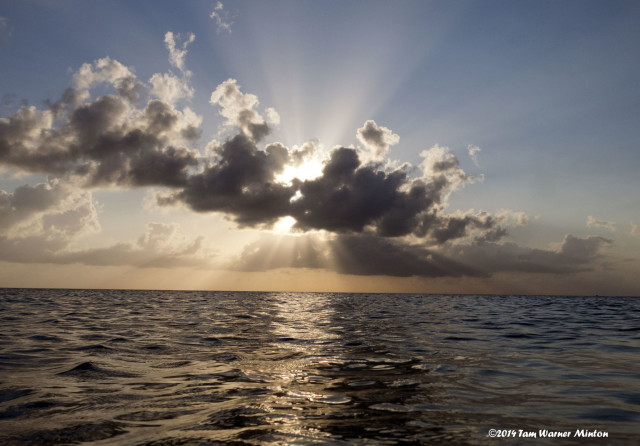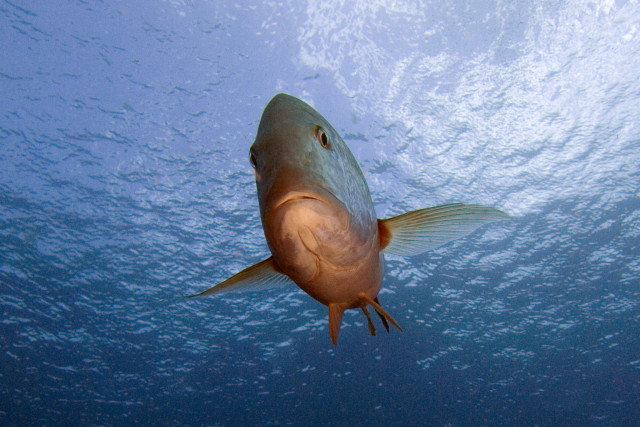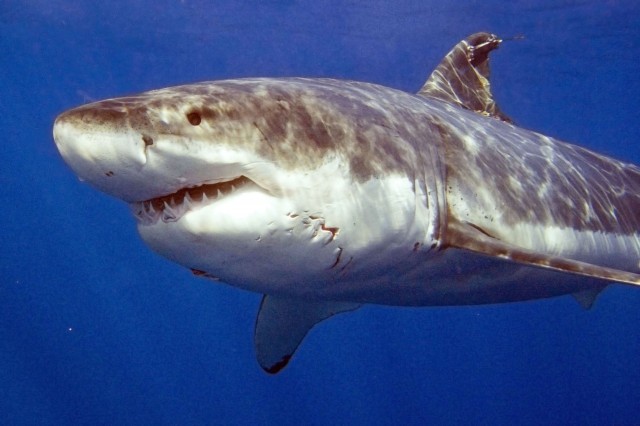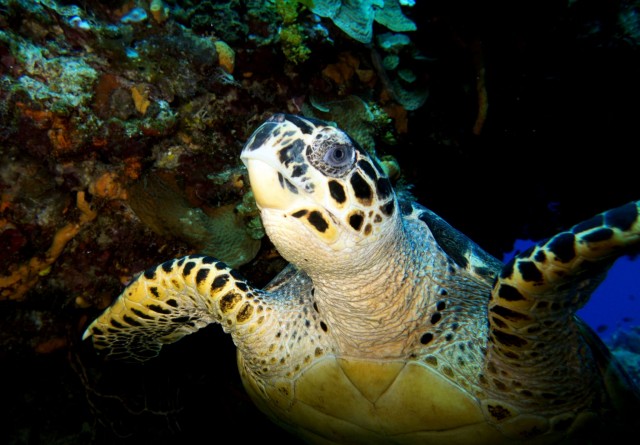Marine Life & Conservation
Our Oceans Are In Critical Danger… Can You Really Make A Difference?

Yes. You can. Each and every one of us can make a difference. How? By making small, but important, choices. Here are some easy examples of how you can start to make a difference:
- Only eat sustainable and responsibly fished seafood. How do you know what is okay to eat? Go to Seafood Watch, the app updated regularly by the Monterey Bay Aquarium and when you go out to eat… check to see which seafood on the menu is sustainable. The lists are separated by area of the country (or world), and given a Green, Yellow, or Red light. Red means the fish is critically overfished. Ever wonder why Red Snapper is hard to find these days? They’ve been overfished, and their populations have critically declined. You can read about it here, at NOAA Fishwatch.
In some areas of the world it is okay to eat Snapper…fresh, line caught snapper….but in others, the populations are not sustainably fished. By using the Seafood Watch app, you can check which fish are okay to eat, and which ones to avoid. Here is the worst cop out of all: well, it’s already dead so I might as well order it. It is the demand for it that drives over-fishing. When people realize that in order to eat Red Snapper in the future they must not order it now… give our fisheries time to recover. Until then, if it is on the Red List, don’t eat or order it!
- Do not eat at restaurants that serve endangered animals. Do not eat at restaurants serving shark. Any kind of shark. Why? Sharks are endangered. If we lose our sharks, our oceans will collapse. That seems pretty dramatic, right? But it is true. Sharks have been around for 450 million years. They are the apex predator (except for humans) in the ocean. They keep marine populations in balance. Sharks tend to eat the older, sicker, slower members of a population, which keeps that population healthier. They keep populations in check, which protects other food sources in the ocean like grasses, plants, corals, mollusks, etc. The foodweb is a constant balancing act, and sharks are a keystone species, meaning that they must be in the ecosystem or that ecosystem will collapse. Sharks kill around 5 people a year. Humans slaughter 75 to 100 million sharks a year, mostly for their fins. For that matter, do not eat turtle, turtle soup, turtle eggs, etc. They are critically endangered!
- When you travel, fly airlines that do not carry endangered species cargo. American Airlines just announced it will no longer carry shark fins as cargo! They join, just to name a few, Air New Zealand, Air Pacific, Cathay Pacific, Singapore Airlines, Jet Airways, and United Airlines. Many, many carriers are joining the crusade to stop transporting ivory, rhino horns, shark fins, manta fins, sea turtles and other endangered species parts. Choose your airline based on this kind of criteria. If they contribute to the shark fin trade, do not fly them. And let them know why you won’t fly them. Use social media to chastise any transport of these endangered species parts.
- When it comes to trading in endangered species, we know the major consumer is China. Other Asian countries are also consumers, but the heart and soul of the shark fin trade is in Hong Kong. The nation of China has stopped serving Shark Fin Soup at state functions… a huge leap forward! Hong Kong has recently followed suit. 95% of shark fins are consumed by Asian countries and go through Hong Kong. The trade is beginning to decline, but we have to keep up the pressure. Shangri-La Hotels and the Peninsula Hotel Group just announced they will no longer serve shark fin soup, bird’s nest, or black moss – all endangered. If you are traveling to Asia, ask the hotel if they sell shark fin soup, any ivory products, or anything with rhino horns. If they do, make the decision not to stay there, and let them know why.
- Don’t buy Chinese medicines with rhino horn, shark liver, or any other endangered species ingredient. Believe me, no scientific study has ever shown that these ingredients cure disease or serve as an aphrodisiac. If there is no demand, the trade will collapse.
Do you know the extent that humans depend upon the ocean to live? The Nature Conservancy points out that the ocean absorbs 1/3 of human produced carbon-dioxide and supplies us with oxygen. Kelp, a plant from the ocean, is used to make salad dressing, dairy products, shampoos and medicines. Compounds from the coral reefs, plants and animals, help treat numerous diseases. Oceans produce 70% more goods and services into our economies and GDPs than land products. Each and every one of us needs the ocean healthy in order to survive. We all have a responsibility.
Rob Stewart, producer of the film Sharkwater, and Revolution, said this recently on his Facebook page: “By 2050, we will live in a world with no reefs, no rainforests, no fish, and 9 billion hungry people.” You might not be here, but if you have children, they will. It is horrifying to think about how catastrophic living in that world would be. There are only a finite amount of resources, and we cannot keep allowing our population to grow without serious consequences to the quality of human life.
Start small, but start soon! If we all make small, good decisions, we can make a big difference. We must all begin now… life depends on it.
For more from Tam, visit www.travelswithtam.com.
Marine Life & Conservation
Double Bubble for Basking Sharks

 The Shark Trust is excited to announce that, for two more days only, all donations, large or small, will be doubled in the Big Give Green Match Fund!
The Shark Trust is excited to announce that, for two more days only, all donations, large or small, will be doubled in the Big Give Green Match Fund!
Donate to Basking in Nature: Sighting Giants
The Shark Trust is hoping to raise £10k which will be doubled to £20k. This will go towards Basking in Nature: Sighting Giants. And they need YOUR help to reach they’re goal.
The Shark Trust’s citizen science project is to monitor and assess basking sharks through sightings; encouraging data collection, community engagement, and promoting nature accessibility. This initiative aims to enhance health and wellbeing by fostering a deeper connection with British Sharks.
Campaign Aims
- Increase citizen science reporting of Basking Sharks and other shark sightings to help inform shark and ray conservation.
- Provide educational talks about the diverse range of sharks and rays in British waters and accessible identification guides!
- Create engaging and fun information panels on how to ID the amazing sharks and rays we have on our doorstep! These can be used on coastal paths around the Southwest. With activities and information on how you can make a difference for sharks and rays!
- Promote mental wellbeing through increasing time in nature and discovering the wonders beneath the waves!
Donate, and double your impact. Click Here
Marine Life & Conservation
Leading UK-based shark conservation charity, the Shark Trust, is delighted to announce tour operator Diverse Travel as a Corporate Patron

 Corporate Patrons provide a valuable boost to the work of The Shark Trust. The Trust team works globally to safeguard the future of sharks, and their close cousins, the skates and rays, engaging with a global network of scientists, policymakers, conservation professionals, businesses and supporters to further shark conservation.
Corporate Patrons provide a valuable boost to the work of The Shark Trust. The Trust team works globally to safeguard the future of sharks, and their close cousins, the skates and rays, engaging with a global network of scientists, policymakers, conservation professionals, businesses and supporters to further shark conservation.
Specialist tour operator Diverse Travel has operated since 2014 and is committed to offering its guests high quality, sustainable scuba diving holidays worldwide. Working together with the Shark Trust will enable both organisations to widen engagement and encourage divers and snorkellers to actively get involved in shark conservation.
“Sharks are truly at the heart of every diver and at Diverse Travel, we absolutely share that passion. There is nothing like seeing a shark in the wild – it’s a moment that stays with you forever!” says Holly Bredin, Sales & Marketing Manager, Diverse Travel.
“We’re delighted to celebrate our 10th year of business by becoming a Corporate Patron of the Shark Trust. This is an exciting partnership for Diverse and our guests. We will be donating on behalf of every person who books a holiday with us to contribute towards their vital shark conservation initiatives around the world. We will also be working together with the Trust to inspire divers, snorkellers and other travellers to take an active role – at home and abroad – in citizen science projects and other activities.”
Paul Cox, CEO of The Shark Trust, said:
“It’s an exciting partnership and we’re thrilled to be working with Diverse Travel to enable more divers and travellers to get involved with sharks and shark conservation. Sharks face considerable conservation challenges but, through collaboration and collective action, we can secure a brighter future for sharks and their ocean home. This new partnership takes us one more valuable step towards that goal.”
For more information about the Shark Trust visit their website here.
For more about Diverse Travel click here.
-

 News3 months ago
News3 months agoHone your underwater photography skills with Alphamarine Photography at Red Sea Diving Safari in March
-

 News3 months ago
News3 months agoCapturing Critters in Lembeh Underwater Photography Workshop 2024: Event Roundup
-

 Marine Life & Conservation Blogs2 months ago
Marine Life & Conservation Blogs2 months agoCreature Feature: Swell Sharks
-

 Blogs2 months ago
Blogs2 months agoMurex Resorts: Passport to Paradise!
-

 Blogs2 months ago
Blogs2 months agoDiver Discovering Whale Skeletons Beneath Ice Judged World’s Best Underwater Photograph
-

 Gear Reviews3 months ago
Gear Reviews3 months agoGear Review: Oceanic+ Dive Housing for iPhone
-

 Marine Life & Conservation2 months ago
Marine Life & Conservation2 months agoSave the Manatee Club launches brand new webcams at Silver Springs State Park, Florida
-

 News3 months ago
News3 months agoWorld’s Best Underwater Photographers Unveil Breathtaking Images at World Shootout 2023









